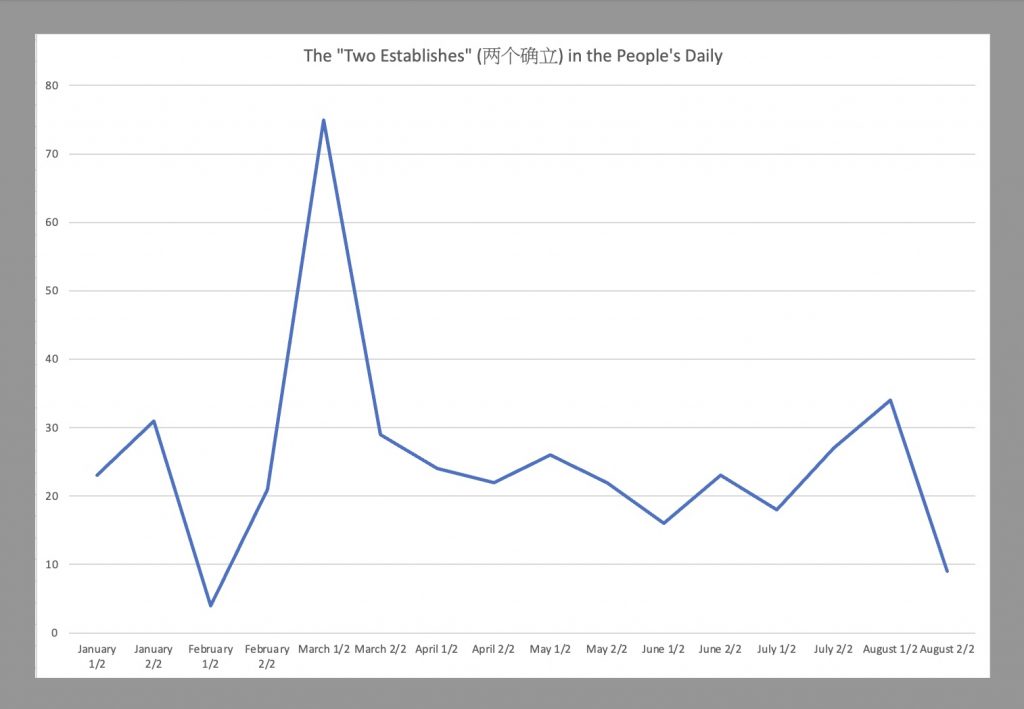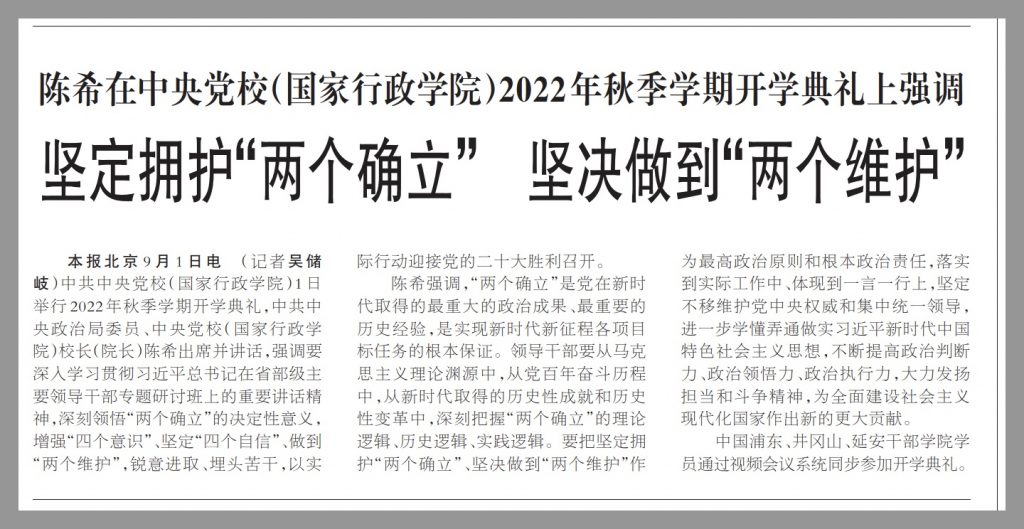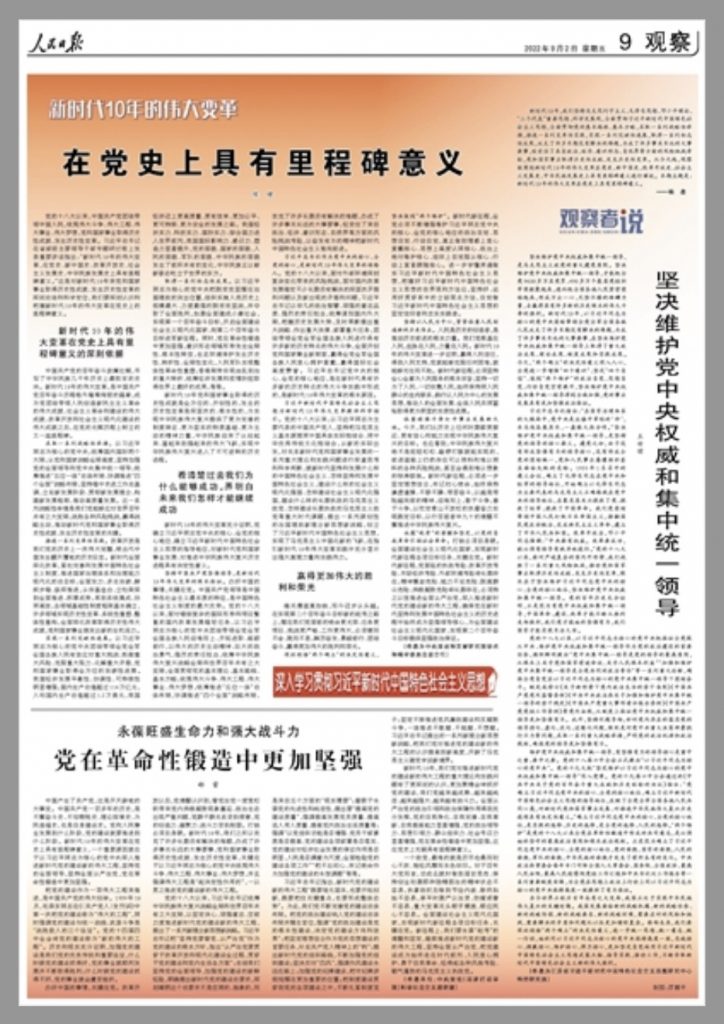
Red train. Image by LLE Photography available at Flickr.com under CC license.
Earlier this week, CMP noted the unusual downward trajectory of a key buzzword signaling the power of Xi Jinping, the “Two Establishes” (两个确立), which seemed to indicate at least a momentary stall in the engine of Xi’s rise in the discourse of the CCP. In today’s People’s Daily, just days after the announcement of October 16 as the probable date of the 20th National Congress, we can clearly see that engine springing back to life.
The “Two Establishes” phrase, which has been a crucial power indicator since the 6th Plenum in November last year — underscoring the unassailable roles of Xi as the Party’s “core” and his “thought” as the guiding ideology — appears in five articles in the Party’s flagship newspaper today.
Two of these articles appear on the front page. The first is a love song for the People’s Liberation Army on the occasion of its 95th anniversary, emphasizing national security, and closing with a call to “unite more closely around the Central Committee of the CCP with Comrade Xi Jinping as the core, deeply understanding the decisive significance of the ‘Two Establishes.'”
The second is about the publication of the fourth edition of Xi Jinping’s The Governance of China (习近平谈治国理政). The article’s headline explains that Wang Huning (王沪宁), secretary of the CCP’s Secretariat, emphasized the need to “deeply study” Xi’s book, but also to “bring the study, propagation and implementation of Xi Jinping Thought on Socialism with Chinese Characteristics for a New Era to a deeper level.”

The Wang Huning article is a clear act of loyalty signaling, mentioning the “Two Establishes” and elevating Xi Jinping’s so-called “banner term,” or qizhiyu (旗帜语), the phrase that encompasses his legacy and claim to power. In all likelihood, the banner term will be shortened during the 20th National Congress from the current unwieldy 16-character version (习近平新时代中国特色社会主义思想) to the more potent five-character “Xi Jinping Thought” (习近平思想).
Another important article printed on page two reports on the opening ceremony for the fall study term at the Central Party School, the CCP’s top institution for the training of Party cadres. The opening address was delivered by Chen Xi (陈希), the current head of the CCP’s Organization Department, who reportedly emphasized that the “Two Establishes” is “one of the greatest political achievements of the Party in the New Era.” The article also includes the phrase in a large headline: “Firmly Supporting the ‘Two Establishes’ and Resolutely Achieving the ‘Two Safeguards'” (坚定拥护’两个确立’坚决做到’两个维护’).

The loyalty signaling continues on page nine, a full page of bright orange that pays tribute to the “great transformations” that have happened in China in the “New Era” over the past 10 years.
An article along the right-hand side of the page reads: “Resolutely Maintaining the Authority and Centralized Unified Leadership of the Central Committee.” It oozes about the past 10 years. “The decisive significance of the ‘Two Establishes’ is deeply rooted in people’s hearts,” it says.

Below is an article from Chen Li (陈理 ), the former director of the Academic and Editorial Committee of the Central Institute of Party History and Literature. The article is again classic loyalty signaling. It teems with “greatnesses” — great victories and glory (伟大的胜利和荣光), “great transformations” (伟大变革), “great projects” (伟大工程), and of course the “great rejuvenation” (伟大复兴).
But the key point is that Chen signals loyalty to Xi Jinping, emphasizing the need to “deeply comprehend the decisive significance of the ‘Two Establishes’ and resolutely achieve the ‘Two Safeguards.'” The “Two Safeguards,” or liangge weihu (两个维护), are about the need to 1) safeguard the “core” status of Xi Jinping within the CCP, and 2) to safeguard the centralized authority of the Party. Together, the “Two Establishes” and the “Two Safeguards” lay claim to the basic principles governing China today, centered on Xi himself — and they define the protection of these principles as the chief task of the country.
It looks like Xi Jinping’s train to the foggy heights of CCP discourse is chugging ahead once again.




















